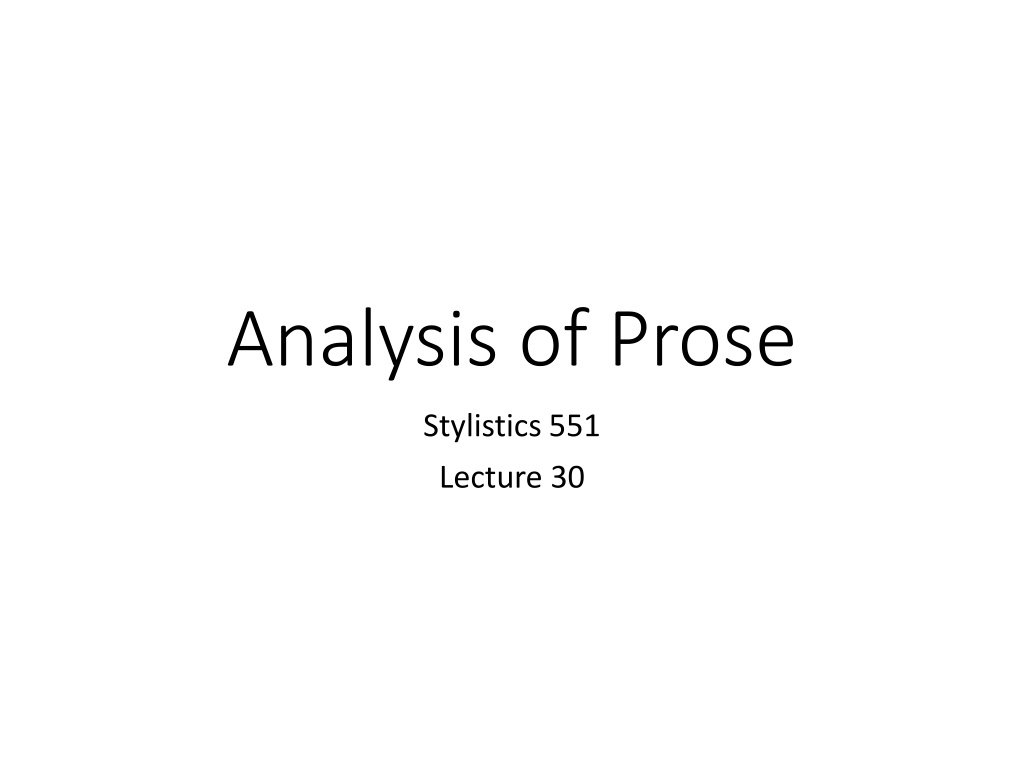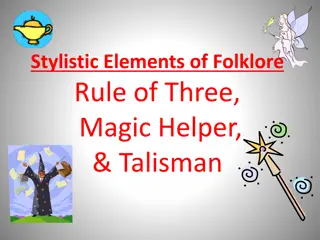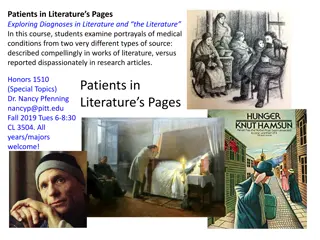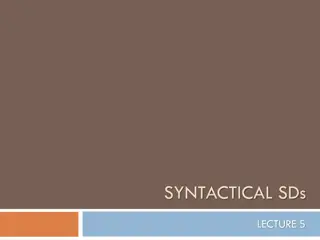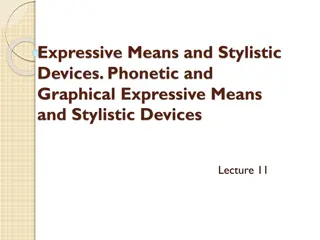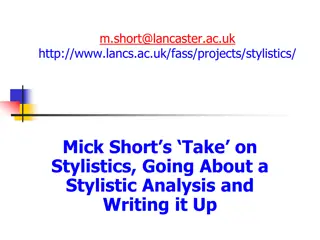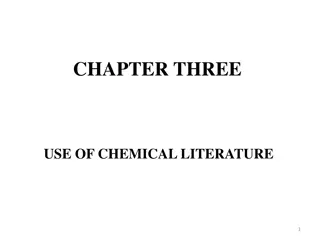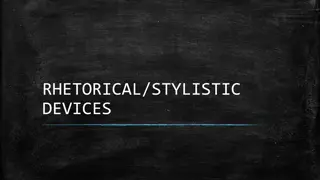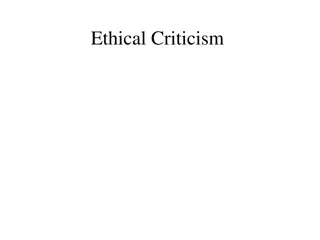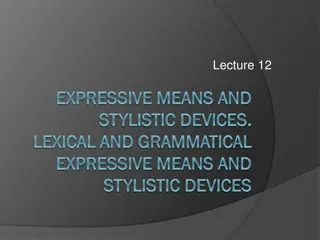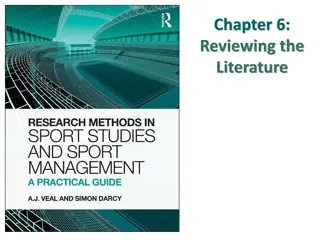Understanding Stylistic Analysis in Literature
Stylistic analysis in literature involves examining linguistic features like lexis, grammar, foregrounded elements, and context to distinguish between literary and non-literary prose. While poetry allows for whole text analysis due to its brevity, prose analysis often focuses on selected extracts for deeper insights into the language of fiction. The distinction between poetic and prosaic language can be subtle, with vocabulary and grammar playing key roles in conveying emotive elements in literary works.
Download Presentation

Please find below an Image/Link to download the presentation.
The content on the website is provided AS IS for your information and personal use only. It may not be sold, licensed, or shared on other websites without obtaining consent from the author. Download presentation by click this link. If you encounter any issues during the download, it is possible that the publisher has removed the file from their server.
E N D
Presentation Transcript
Analysis of Prose Stylistics 551 Lecture 30
Most poems are short, and so it is possible to analyse a whole text. And when analysing poetry we noticed that we could get a long way by concentrating on foregrounded features: particularly deviation and parallelism.
On the other hand, for novels and short stories, because they are much longer, stylistic analysis can only be done on selected extracts which are representative or specially interesting for some reason. And one of the results of this extra length is that effects in prose are often spread through whole texts, or textual extracts, and so, just looking at foregrounded features will not necessarily reveal enough of what we need to show.
Analyzing the Language of Fiction Analyzing the Language of Fiction Since fiction is written in prose, all discussion about the language of fiction necessarily concerns with the language of prose in fiction. For the word fiction taken alone may refer to invention of character, plot and other schemes that create and present a world of imagination. In linguistic studies, however, our concern is not with the invention of characters, or plot construction not directly, that is. The primary concern is with those linguistic features, or patterns of the narrative which distinguish literary prose from non- literary prose. Literariness is considered to be an elusive quality. At best it is defined as the emotive or expressive element of language in poetry or prose fiction.
The only linguistic element associated with the emotive element in literature has been found to be lexis or vocabulary. There is a special vocabulary of literature, which will look deviant, outside literature, but it conveys the subjective and emotive meanings in literature. But then, much of literature is written in normal language. In that case the literary element is always difficult to define in purely linguistic terms especially in lengthy prose.
Checklist: I. LEXIS II. GRAMMAR III. FOREGROUNDED FEATURES (INCLUDING FIGURES OF SPEECH) IV. COHESION AND CONTEXT
There is generally an agreement that apart from metre, the differences between the language of poetry and the language of prose may not be readily discernible. The study of some forms of poetry may sometimes reveal more readily some linguistic features of vocabulary and grammar which appear to be deviant (Widdowson) when compared to the norm. But then a careful examination of literary prose, especially in fiction, also reveals the same features- only differently distributed (Lodge).
The literary element in both, poetry and prose fiction, consists in the fashioning of patterns over and above those required by the actual language system (Widdowson). Now these patterns need not be deviations nor may they appear to be lying apart from the patterns that form the norm of language. The components of these patterns my be deviant or non- deviant or both. The literary patterns fashioned over and above the normal language are recognised to be images, metaphors, similes, symbols, figures of speech, irony paradox and a host of other rhetorical devices that may or may not be specific to certain genres. And they may be composed of deviant, or non-deviant or both kinds of components.
Hence in this investigation, only those sentences are studied that strike me as ingenious expression of some kind on the basis of my intuitive judgement as an ordinary reader. My aim is merely to explore and find some linguistic patterns in Sara s sentences. I have used linguistic tools and terminology primarily for the sake of precision. But in the study of literary expression, it is absolutely essential not to be confined to/ by it. To seek linguistic ground for reactions or responses intuitively aroused in the reader through the experience of literary or poetic language, linguistic structures must be interpreted for functions in a literary context. Hence intuition guides linguistic analysis made here, and analysis and interpretation merely seek, at least at this initial stage of enquiry, to account for reactions and responses that Sara s expression arouses in ordinary readers, like me.
Meatless Days Meatless Days by Sara Sulehri I thought she was the very air I breathed, but Ifat was prior, prior. Karachi s traffic grew lunchtime crazed. She gulped on her own eloquence, her breakfast bosom quaked I was surprised beyond measure when that big head bent backward and wept, a quick summer shower of tears. By the time he left, all surfaces were dry. Dadi with her flair for drama had allowed life to sit so heavily upon her back that her spine wilted and froze into a perfect curve, and so it was in the posture of a shrimp that she went scuttling through the day. Sometimes, to my mother s great distress, Dadi could berate satan in full eloquence only after she had clambered on top of the dining room table and lain there like a molding centerpiece. Dadi . waited for the return of her eldest son, my father. He had gone careening off to a place called Inglistan, or England, fired by some of the several enthusiams made available by the proliferating talk of independence.
Meatless Days Meatless Days by Sara Sulehri Dadi . waited for the return of her eldest son, my father. He had gone careening off to a place called Inglistan, or England, fired by some of the several enthusiams made available by the proliferating talk of independence. I can tell this only to someone like Anita as we go perambulating through the grimness of New Haven and feed upon the pleasures of our conversational ways. There are many more like these. About these examples we notice that they contain different linguistic categories of ingenious expression.
Meatless Days Meatless Days by Sara Sulehri These categories are the following: 1. Words (Ifat was prior, prior) 2. Collocations (lunchtime crazed, breakfast bosom) 3. Phrases ( a quick summer shower of tears) 4. Clauses (She gulped on her own eloquence, her breakfast bosom quaked) In linguistic description, we shall regard, lunchtime crazed and breakfast bosom as deviant collocations. And though the words gulp or eloquence are not in themselves deviant, the clause She gulped on her eloquence is not a norm either.
Meatless Days Meatless Days by Sara Sulehri According to semantic rules of English gulp requires a food item and not eloquence as its object. Since it is an unusual combination of ordinary words, it is deviant a form of ingenious expression which has symbolic meaning in its context. Similarly summer shower of tears is symbolic description of tears it is not an ordinary shower but the literal meaning (of an image) are extended to apply it to a different kind of phenomenon. This symbolic use of language is what we call ingenuity of literary expression.
Meatless Days Meatless Days by Sara Sulehri One can infer from this brief discussion that Sara s ingenious literary expression consists in the blending of some deviant patterns into non-deviant patterns in her language. The full significance of their power and beauty can come into notice only in a larger context.
Games at Twilight Games at Twilight Anita Desai It was still too hot to play outdoors. They had had their tea, they had been washed and had their hair brushed, and after the long day of confinement in the house that was not cool but at least a protection from the sun, the children strained to get out. Their faces were red and bloated with the effort, but their mother would not open the door, everything was still curtained and shuttered in a way that stifled the children, made them feel that their lungs were stuffed with cotton wool and their noses with dust and if they didn t burst out into the light and see the sun and feel the air, they would choke.
Games at Twilight Games at Twilight Anita Desai Please, ma, please, they begged. We ll play in the veranda and porch we won t go a step out of the porch. You will, I know you will, and then No we won t, we won t, they wailed so horrendously that she actually let down the bolt of the front door so that they burst out like seeds from a crackling, overripe pod into the veranda, with such wild, maniacal yells that she retreated to her bath and the shower of talcum powder and the fresh sari that were to help her face the summer evening.
